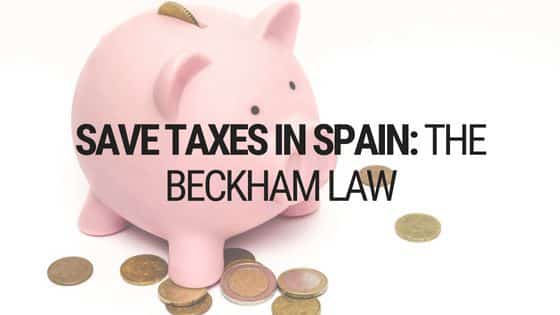How Expats Can Significantly Reduce Tax Payments
Handling taxes can be challenging in your own country, and it can become even more complicated when you are working abroad. Luckily, non-Spanish workers can benefit from significant tax cuts thanks to a legislation that was introduced in 2005, commonly known as the "Beckham Law."
The main purpose of the law is to entice foreign professionals to come to Spain. According to the law, foreign residents employed in Spain can pay taxes as non-residents for the first six years of their stay in the country.
The Beckham Law, which was named after soccer player David Beckham and initially benefited him as one of the first foreigners, previously applied to all individuals who lived in Spain for over six months, making them tax residents and subject to the country's progressive income tax system.
Income
In Spain, all income, regardless of its source within the country or from international sources, was subject to progressive taxation. The tax rate started at 19% for individuals with lower incomes and gradually increased to almost 50% for those earning over €60,000 annually.
Currently, expatriate individuals who submit an application for the Beckham Law are subject to the predetermined fixed rate for non-tax residents. This stands at 24% for those with an income below €600,000.
For amounts exceeding this threshold, the rate will automatically switch to a set 45%
For who is this relevant?
This legislation is especially beneficial for expatriates residing in Spain who continue to generate income from overseas sources, as it allows them to evade paying graduated taxes on their global earnings.
It is of significance to note that this legislation solely pertains to the year in which an individual relocates to Spain, as well as the subsequent five years. This implies that after a period of six years, one will be considered a formal tax resident and will be subject to paying the tiered income tax rates that are applicable to Spaniards.

Who is qualified?
The Beckham Law enables a majority of non-native employees living in Spain to request for tax payment deductions.
This category covers individuals from other countries who have recently relocated to Spain for employment, affluent individuals holding top-level job positions, majority of telecommuters, workers who possess a "highly skilled" work permit. They generate 40% of their income from their permitted activities, workers holding an administrative role in their organization, as well as partners or offspring of telecommuters.
Self-employed individuals and, interestingly enough, professional athletes are the only ones who cannot avail themselves of the Beckham Law.
Although the criteria for eligibility are broad, there are still some extra requirements.
According to the Beckham law, individuals seeking tax payments deductions must not have lived in Spain within the last five years. They must have relocated to Spain for employment purposes, which requires them to have a job contract with a Spanish company. Additionally, their primary work activities should occur in Spain, and their income from foreign sources should not exceed 15% of their total earnings.
Instructions for Applying
To submit your application, all you have to do is complete the 149 model tax form and deliver it to the Agencia Tributaria, accompanied by a passport, NIE number, employment agreement, and social security number. You have to submit your application within six months after being registered as an employee of a Spanish company in the Social Security system.
Check here if you want to look at different properties in Costa del Sol


